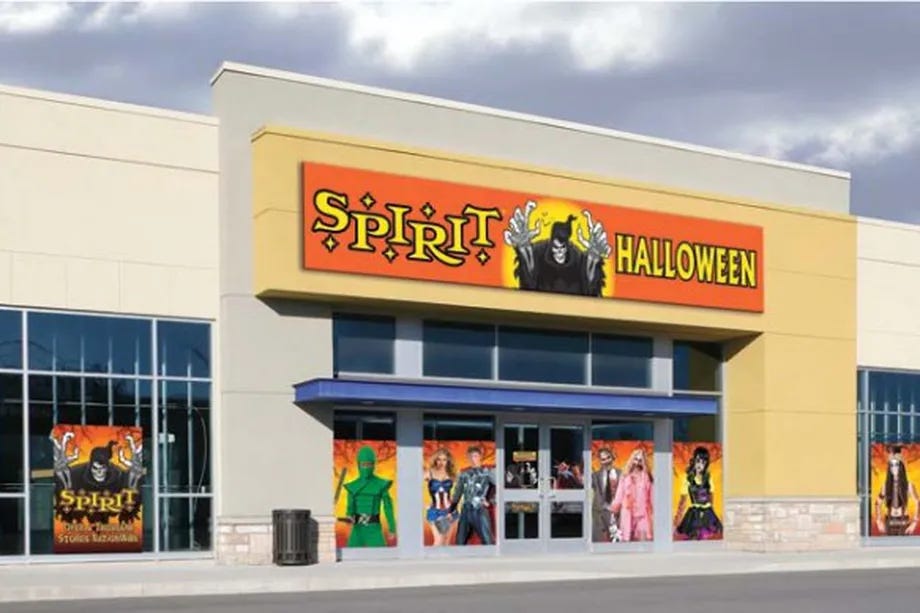You see them spring up every Halloween, but I bet you don’t give much consideration to them. The seasonal stores, that is. “Halloween Express”, or “Spirit Halloween”, something like that. Popping up in a languishing retail strip or a neglected corner of the mall, where once stood a long-forgotten Circuit City or Bombay Company, appearing practically overnight like an August lily after a day of rain.
I’m sure you know what I’m talking about, and there’s a good chance you’ve even been inside, looking for a pair of sexy cat ears or a hockey mask or that last vial of stage blood before your party. Chances are, you haven’t thought much about what goes on behind this operation, though.
Sure, there’s that retail face - there’s nothing to hide there. A few hurriedly constructed slat-walls and little attempt to conceal the past usage of the space. “What could they be hiding there?” Well, those costumes have to come from somewhere, don’t they?
Everyone knows Santa has a workshop where the toys are made.
Few are so unfortunate to know of the Halloween workshop.
Somewhere in middle America - maybe even in your town - there’s a dilapidated warehouse. Once they made things there, and maybe some day an enterprising developer will turn it into lofts. For now, though, it’s quiet. Nothing’s made here anymore.
Not above ground, at least.
Slide away a metal plate in the floor, and you’ll find an elevator. It shimmies and shudders as it takes you down a shaft so deep you’ll think you’re headed to hell itself. And maybe you are. The darkness as you descend could drive a man mad before he even reached the bottom. That’s what they’d told me, at least.
I’d never seen the surface. I was born down here, into a life of costume-making. Some people come from The Land Above, and they’ve had their reasons for ending up here. Desperation. Debt. My parents met here, working 18-hour shifts on the seemingly-endless factory floor. They made everything. All your favorite characters, as seen from just outside the fence of copyright law. “One-Eyed Yellow Guy”, “Bow-and-Arrow Girl”, “Cartoon Rodent” and “Business Shithead President”. They made them all.
Fraternization was strictly forbidden among the workers. The goal was to prevent unrest. First workers talk, then they unite. They couldn’t risk it. Even speaking to one another could get you beaten, or worse. People would disappear from the floor and never be seen again.
So you can imagine their discontent when my mother turned up pregnant. It was a scandal. You could hear the whispers all over the floor. They’d tried to keep their dalliances secret, but everyone knew my father was to blame.
If it had been anyone else, he would’ve been dead by the end of the day. Not my father, though. He was too valuable. He was the best costume-maker they had.
Anything the others couldn’t do, he could. Capture the exact essence of a moment, the blip in the zeitgeist, and distill it into three dollars worth of polyester fabric that could be resold topside for $39.99. “Flight Attendant Who Inflated Emergency Slide”? His work. “Undecided Red Sweater Man”? Him. “Grass-Eating Man In White Hat”? Him. He did what no one else could do.
That’s the only reason they spared his life.
They only spared mine because they thought I might be as good as he was. I was born underground, and I was raised there. Groomed from before my birth to be the best discount costume-maker the world would never see. As soon as I was old enough to sit at a work table, they put me to it, assigned to special projects my father didn’t have time for.
But there’s some things that can’t be passed on through genetics. The sight of a bird in a tree. A crisp autumn breeze. A lifetime of pop culture ephemera to draw on. I had his technical skill, his feel for the cloth and his mastery with a needle and thread, but I lacked the eye. They could show me a picture of “Escaped Llama”, but I’d never seen one myself. I didn’t know how they moved, what they’d look like in three dimensions.
My minders grew angry, but persisted. Give him an easy assignment, they said.
One last chance. A simple task, one no worthy costume-maker could mess up.
Just make a lion.
I stared at my cloth and my tools. I began to sob. There had been no zoos in my childhood. No circuses, no MGM movies. I had no idea what a lion looked like. But I knew the danger we’d face if I didn’t try, if I didn’t succeed. So I worked, for hours. I sweated, and my fingers throbbed and bled.
When I was done, it was clear from the looks on their faces that I had failed. The foreman opened his mouth to deliver what would surely be my death warrant, and that’s when it all happened. My father struck him across the face, a sucker-punch that took him to the floor. Other nearby workers quickly turned on the guards. “RUN!”, my father shouted. They’d been planning a rebellion without telling me. The whole floor broke into coordinated riot. And it was clear—their only hope was to clear a path for me.
To the elevator. To the light. So that the spawn of the depths could be free. I ran, as fast as I could. I reached the elevator and slammed the door shut just ahead of the pursuing guards. I could hear the gunshots, and the screams. “Don’t look back!”, my father yelled. “Get to the light!”
I felt like days that I was travelling, clattering up that shaft. When I stepped out of the warehouse, the sun blinded me. It burned my skin. I’d never felt daylight before. I wasn’t prepared.
I covered myself with the only thing I had.
The costume that got my father killed.

—Scott Hines (@actioncookbook)



